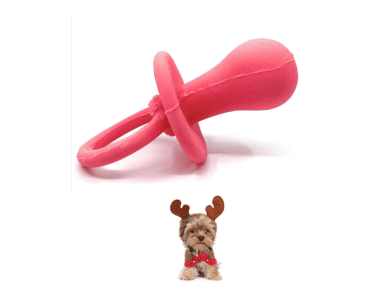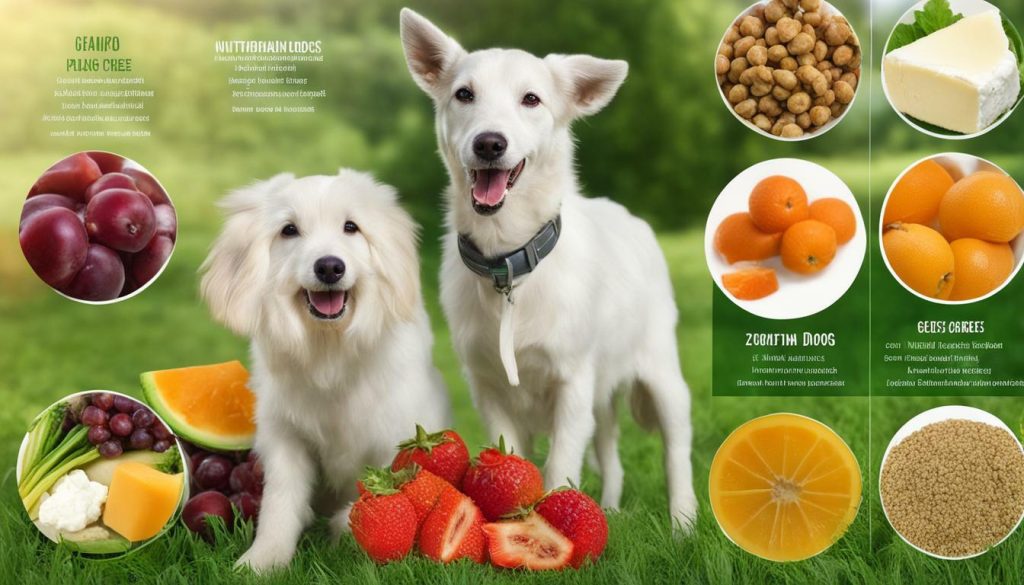
If you’ve ever wondered, “Can dogs eat goat cheese?” it’s essential to understand its effect on your pet’s overall diet. While goat cheese is not toxic for dogs, it can aggravate those with lactose intolerance. Considering their specific dietary needs before introducing goat cheese into their meals is important.
- Goat cheese is not toxic for dogs but can exacerbate lactose intolerance.
- Consult a vet to determine your dog’s safe amount of goat cheese based on age, weight, and health.
- Goat cheese can be high in sodium and fat, contributing to obesity and other health issues.
- Be cautious with store-bought goat cheese, as some may contain toxic additives.
- Feed goat cheese to dogs in moderation and only serve plain cheese without additional ingredients.
Is Goat Cheese Safe for Dogs?
While goat cheese is not toxic to dogs, some factors should be considered before feeding it to your furry friend. Like humans, some dogs may have lactose intolerance, which can cause digestive issues such as diarrhea, gas, and bloating. Goat cheese contains lactose in smaller amounts than cow’s milk cheese. So, if your dog is lactose intolerant, goat cheese may still aggravate their condition.
It’s important to note that goat cheese should only be given to dogs as an occasional treat, not a regular part of their diet. The amount of safe goat cheese for dogs to consume depends on various factors, including age, weight, and overall health. If you’re unsure, it’s always best to consult your veterinarian to determine the appropriate portion size for your pet.
Another consideration when feeding goat cheese to dogs is its high sodium and fat content. Excessive sodium intake can lead to health issues such as high blood pressure, while excess fat consumption can contribute to obesity and related conditions. Therefore, it’s crucial to be mindful of the quantity of goat cheese given to dogs, ensuring it remains within reasonable limits.
“While goat cheese is generally safe for dogs, it’s important to remember that moderation is key. Feeding your furry friend too much goat cheese can potentially lead to health problems in the long run. Always prioritize your pet’s overall well-being and consult with a veterinary professional if you have any concerns.”
| Pros of Goat Cheese for Dogs | Cons of Goat Cheese for Dogs |
|---|---|
|
|
Given these considerations, you must be cautious when choosing goat cheese for your dog. Opt for plain, unsalted goat cheese without additional flavors, herbs, or additives. This will minimize the risk of introducing harmful ingredients into your pet’s diet. Additionally, it’s worth exploring alternative cheese options that may be better suited for your dog’s specific needs.
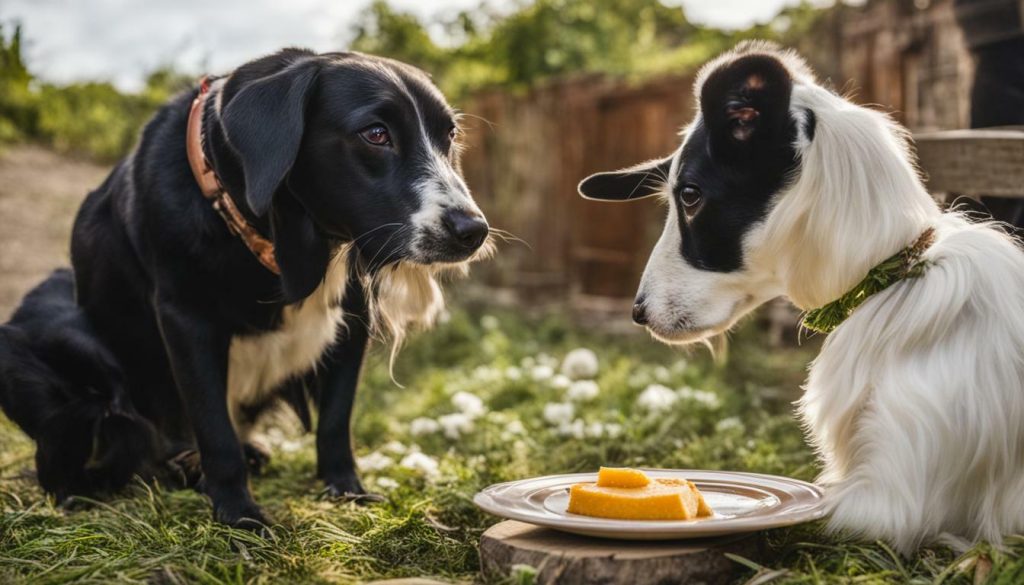
Remember, moderation is the key to safely incorporating goat cheese into your dog’s diet. Always monitor your pet’s health and behavior when introducing new foods, and consult with your veterinarian if you have any concerns. By being mindful of the potential risks and benefits, you can ensure that your furry friend enjoys their occasional goat cheese treat without compromising their well-being.
Benefits of Goat Cheese for Dogs
Goat cheese can offer certain health benefits to dogs when given in moderation. It is a good source of protein, calcium, and vitamins A and B, essential for overall canine health. The amino acids in goat cheese can help support muscle growth and repair, making it a great snack option for active dogs.
Furthermore, goat cheese is easier to digest than cow’s milk cheese, making it a suitable choice for dogs with sensitive stomachs or those who are lactose intolerant. It contains lower lactose levels, making it less likely to cause digestive upset or discomfort.
When serving goat cheese to your furry friend, it’s important to consider portion sizes. Too much fat and sodium can harm dogs, leading to weight gain and potential health issues. Feeding goat cheese as an occasional treat is recommended, and the ideal portion size should be determined by your dog’s size, age, and overall health. Consulting with your veterinarian will help ensure you give your dog the appropriate amount of goat cheese.
Table: Nutritional Content of Goat Cheese
| Component | Amount per 100g |
|---|---|
| Protein | 22g |
| Fat | 30g |
| Calcium | 194mg |
| Vitamin A | 384µg |
| Vitamin B | 0.27mg |
While goat cheese can benefit dogs, it should not replace their regular balanced diet. It is always important to prioritize a well-rounded canine diet of high-quality dog food that fulfills all their nutritional requirements.
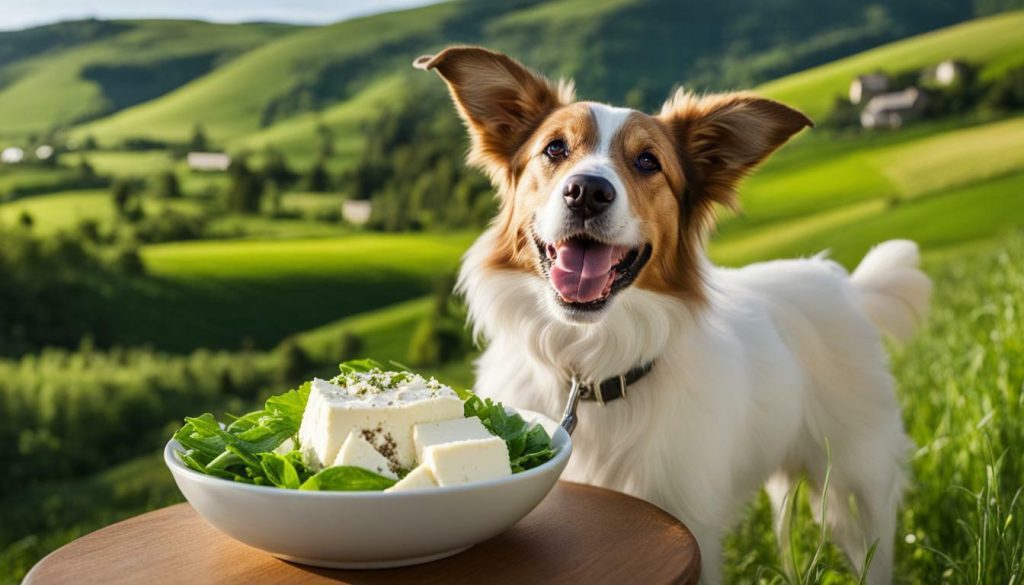
Dogs with lactose intolerance may experience discomfort and digestive issues if they consume goat cheese. While goat cheese is not toxic to dogs, it can aggravate their lactose intolerance. Lactose is a sugar found in milk products, and some dogs lack the enzyme lactase, which is responsible for breaking down lactose. Without enough lactase, the lactose in goat cheese can be difficult for dogs to digest, leading to symptoms such as diarrhea, bloating, and gas.

It is essential to monitor your dog’s reaction when introducing goat cheese to their diet. Start with a small amount and observe any adverse effects. If your dog shows signs of discomfort or digestive issues after consuming goat cheese, it’s best to avoid giving it to them in the future. Instead, consider alternative cheeses lower in lactose or lactose-free, such as hard cheeses like cheddar or Swiss.
When feeding goat cheese to dogs, it’s crucial to practice moderation. Even if your dog can tolerate small amounts of goat cheese without any adverse reactions, it should still be given as an occasional treat rather than a regular part of their diet. Too much goat cheese can contribute to obesity and other health issues due to its high sodium and fat content. Additionally, be cautious when choosing store-bought goat cheese, as some varieties may contain toxic additives that could harm your dog.
To summarize, while goat cheese is not toxic for dogs, those with lactose intolerance may experience discomfort and digestive issues if consumed. It’s important to start with small amounts and monitor your dog’s reaction, avoiding goat cheese if any adverse effects occur. Feed goat cheese in moderation and consider alternatives that are lower in lactose. Always prioritize your dog’s health and consult your veterinarian for personalized advice regarding their diet.
Moderation is Key
While it’s safe for dogs to have goat cheese occasionally, it’s crucial to understand the right portion size to avoid any potential health issues. The amount of goat cheese safe for a dog to consume depends on age, weight, and health. Consulting with a veterinarian can provide valuable guidance tailored to your dog’s needs.
Goat cheese can be high in sodium and fat, which can contribute to obesity and other health issues if consumed in excessive amounts. As an owner, it’s important to be mindful of your dog’s overall diet and ensure that goat cheese is only given in moderation.
Choosing plain varieties without additional additives or seasonings is best when serving goat cheese. Store-bought goat cheeses, in particular, may contain toxic additives that can harm your dog’s health. Sticking to simple and natural options can minimize the risk and provide a safer treat for your furry friend.

| Type of Cheese | Calories per 1 oz | Sodium per 1 oz | Fat per 1 oz |
|---|---|---|---|
| Goat Cheese | 70 | 75mg | 6g |
| Cheddar Cheese | 115 | 180mg | 9g |
| Mozzarella Cheese | 85 | 190mg | 6g |
Table: A comparison of goat cheese nutrition with other common cheese varieties.
Remember, moderation is key when it comes to feeding goat cheese to dogs. By understanding the right portion size and choosing plain options, you can safely treat your furry friend to the occasional goat cheese snack without compromising their health.
Considerations for Feeding Goat Cheese to Dogs
If you’re considering giving your dog goat cheese, there are a few factors you should consider and alternative cheese options to explore. While goat cheese is not toxic to dogs, it may cause digestive issues for those with lactose intolerance. It’s important to remember that goat cheese should only be given as an occasional snack and not a regular part of their diet.
The amount of goat cheese safe for your dog to consume depends on various factors such as age, weight, and overall health. It’s always best to consult your veterinarian to determine the appropriate portion size for your furry friend. They can provide tailored advice based on your dog’s specific needs.
It’s worth noting that goat cheese can be high in sodium and fat, contributing to obesity and other health issues in dogs. It’s essential to be mindful of the quantity you give to your pet to avoid any potential negative effects on their well-being.
When choosing goat cheese for your dog, choose plain varieties without additional ingredients or additives. Some store-bought goat cheeses may contain harmful substances that could harm your dog’s health. You can ensure your pet enjoys a safe and delicious treat by serving plain goat cheese in moderation.
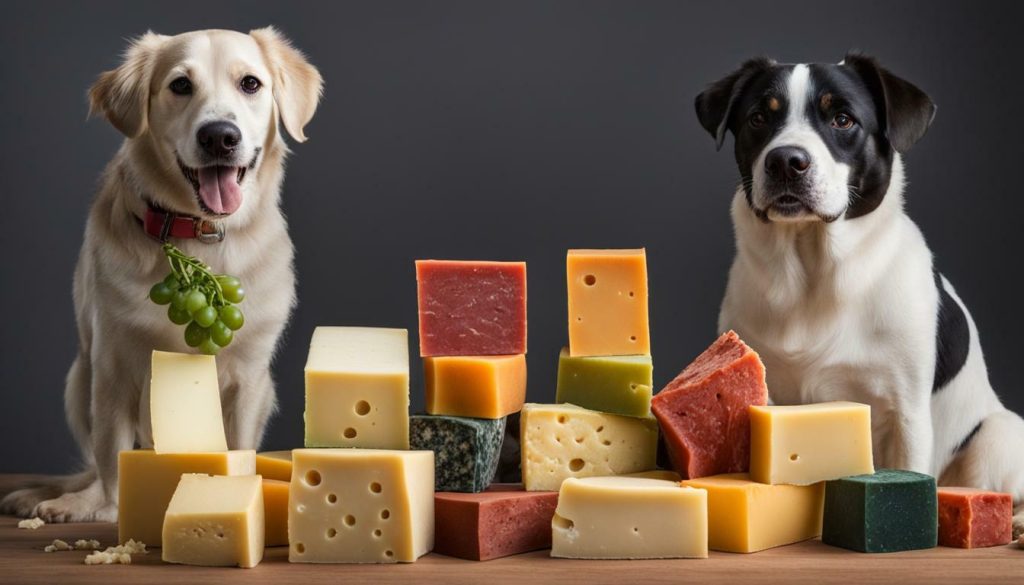
| Alternative Cheeses for Dogs | Description |
|---|---|
| Feta Cheese | A lower-lactose option that can be a suitable alternative to goat cheese. |
| Cottage Cheese | It is rich in protein and low in lactose, making it a nutritious choice for dogs. |
| Cheddar Cheese | It can be given in small quantities as an occasional treat, but avoid feeding excessively. |
Watch Out for Sodium and Fat Content
Goat cheese can be high in sodium and fat, contributing to obesity and other health issues in dogs. When considering adding goat cheese to your pet’s diet, it’s important to be mindful of these factors.
The table below provides an overview of the typical sodium and fat content in various types of goat cheese:
| Type of Goat Cheese | Sodium Content (mg per 100g) | Fat Content (g per 100g) |
|---|---|---|
| Fresh Goat Cheese | 87 | 17 |
| Goat Cheese Log | 453 | 42 |
| Goat Cheese Feta | 1116 | 21 |
As you can see, different types of goat cheese vary in their sodium and fat content. It’s important to read the nutrition labels carefully and choose fewer options for these potentially harmful components.
To give you an idea of how goat cheese fits into a balanced diet for dogs, it is recommended to serve it as an occasional treat rather than a regular part of their meals. A small amount, around 1-2 teaspoons per serving, can be a flavorful addition to their diet without causing significant health problems.
Remember, moderation is key when it comes to feeding goat cheese to dogs. Always consult your veterinarian to determine the appropriate amount and frequency based on your dog’s needs and health conditions.
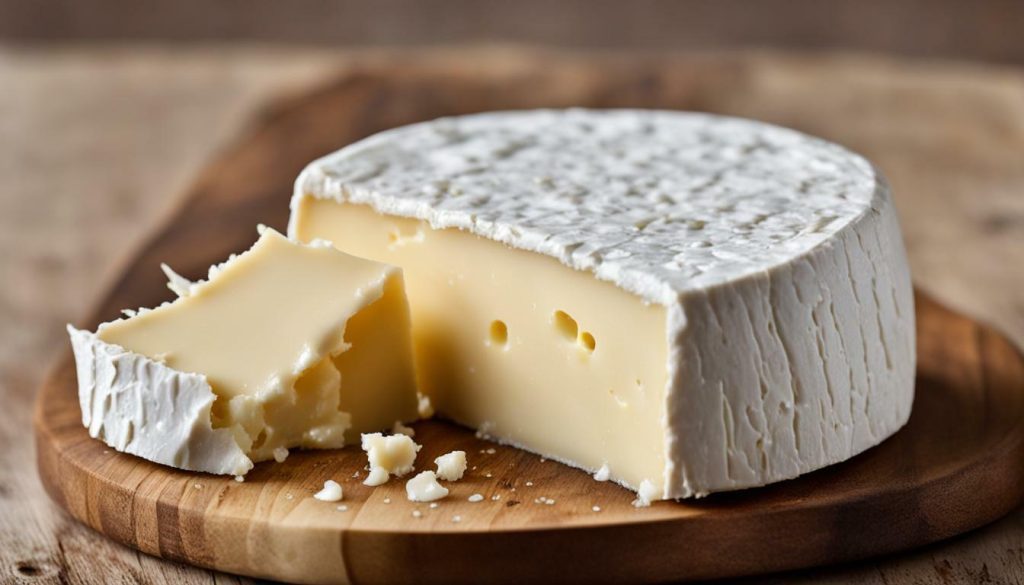
Be vigilant when selecting store-bought goat cheese for your dog, as some products may contain toxic additives. These additives can harm your pet’s health and cause various digestive issues or lead to poisoning. To ensure the well-being of your furry friend, it’s crucial to read the labels carefully and choose high-quality, natural goat cheese without any additional ingredients.
Some common toxic additives in store-bought goat cheese include preservatives, artificial flavors, and colors. These additives often enhance the cheese’s taste, appearance, and shelf life. However, they can have adverse effects on your dog’s health. Preservatives like sodium nitrate and potassium sorbate have been linked to digestive problems and allergic reactions in dogs. Artificial flavors and colors may also trigger sensitivities and allergies.
When purchasing goat cheese for your dog, choose brands that prioritize natural ingredients and avoid those with long ingredient lists or unfamiliar additives. Look for products that are labeled as organic or made with minimal processing. Additionally, consider contacting local farmers or cheese producers who prioritize using organic and natural ingredients in their products.
By being mindful of the ingredients in store-bought goat cheese, you can ensure that your dog enjoys a safe and healthy snack. Remember, moderation is key, and it’s always a good idea to consult your veterinarian before introducing new foods into your dog’s diet.
| Common Toxic Additives in Store-Bought Goat Cheese | Effects on Dogs |
|---|---|
| Sodium Nitrate | Digestive problems, allergic reactions |
| Potassium Sorbate | Digestive problems, allergic reactions |
| Artificial Flavors | Sensitivities, allergies |
| Artificial Colors | Sensitivities, allergies |
Conclusion
While goat cheese is not toxic to dogs, it should be given in moderation and as an occasional treat to avoid potential health issues. Can dogs eat goat cheese? Yes, they can, but it is important to understand the impact of goat cheese on your pet’s diet.
When feeding your dog goat cheese, it is crucial to consider factors such as age, weight, and overall health. Consulting with a veterinarian is recommended to determine the appropriate amount of goat cheese for your furry friend.
It is worth noting that goat cheese can be high in sodium and fat, contributing to obesity and other health problems in dogs. Therefore, it is essential to be mindful of the quantity and frequency of goat cheese consumption.
In addition, it is important to be cautious when selecting store-bought goat cheese for your dog. Some varieties may contain toxic additives that could harm your pet’s health. Opting for plain, additive-free goat cheese is the safest option.
In summary, while dogs can eat goat cheese, practicing moderation and considering your dog’s needs is crucial. Monitoring their diet and ensuring they receive a balanced meal plan is key to maintaining their overall health and well-being. So, next time you share a snack with your furry companion, remember to keep it in moderation!
FAQ
Can dogs eat goat cheese?
While it’s not toxic for dogs, goat cheese can aggravate those with lactose intolerance. It can be given as an occasional snack but should not be a part of their regular diet.
Is goat cheese safe for dogs?
Goat cheese is generally safe for dogs. However, it’s important to consider factors like age, weight, and health. Consulting a vet is recommended to determine the appropriate amount.
What are the benefits of goat cheese for dogs?
Goat cheese can provide dogs with protein and calcium. It may also be a good source of probiotics and improve digestion.
How does goat cheese affect dogs with lactose intolerance?
Dogs with lactose intolerance may experience digestive issues if they consume goat cheese. It’s best to avoid giving it to them or consult a vet for guidance.
Can dogs have goat cheese occasionally?
Yes, dogs can have goat cheese as an occasional snack. The amount should be monitored and given in moderation.
Are there alternative cheeses for dogs?
If dogs cannot tolerate goat cheese, alternative options include cottage cheese, plain yogurt, or low-lactose cheeses like cheddar or mozzarella.
Should I be concerned about the sodium and fat content in goat cheese?
Yes, goat cheese can be high in sodium and fat, contributing to obesity and other health issues in dogs. Monitoring their intake is important.
Are there toxic additives in store-bought goat cheese?
Some store-bought goat cheeses may have toxic additives. It’s important to be cautious and choose plain goat cheese without any harmful ingredients.
Can dogs eat goat cheese as part of their regular diet?
Goat cheese should not be a part of a dog’s regular diet due to the potential risks associated with lactose intolerance, sodium, and fat content. It should be given sparingly as an occasional treat.


